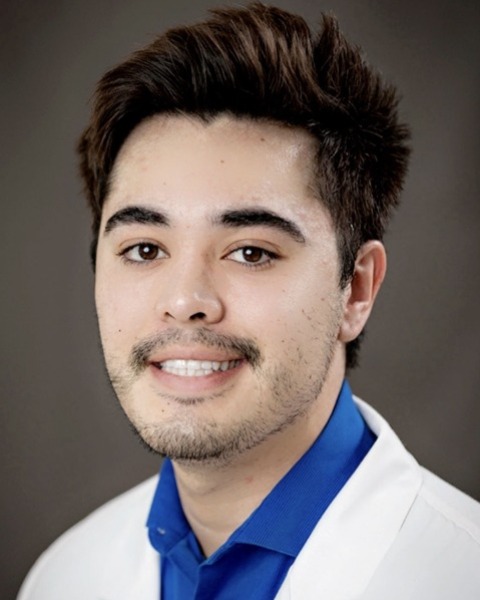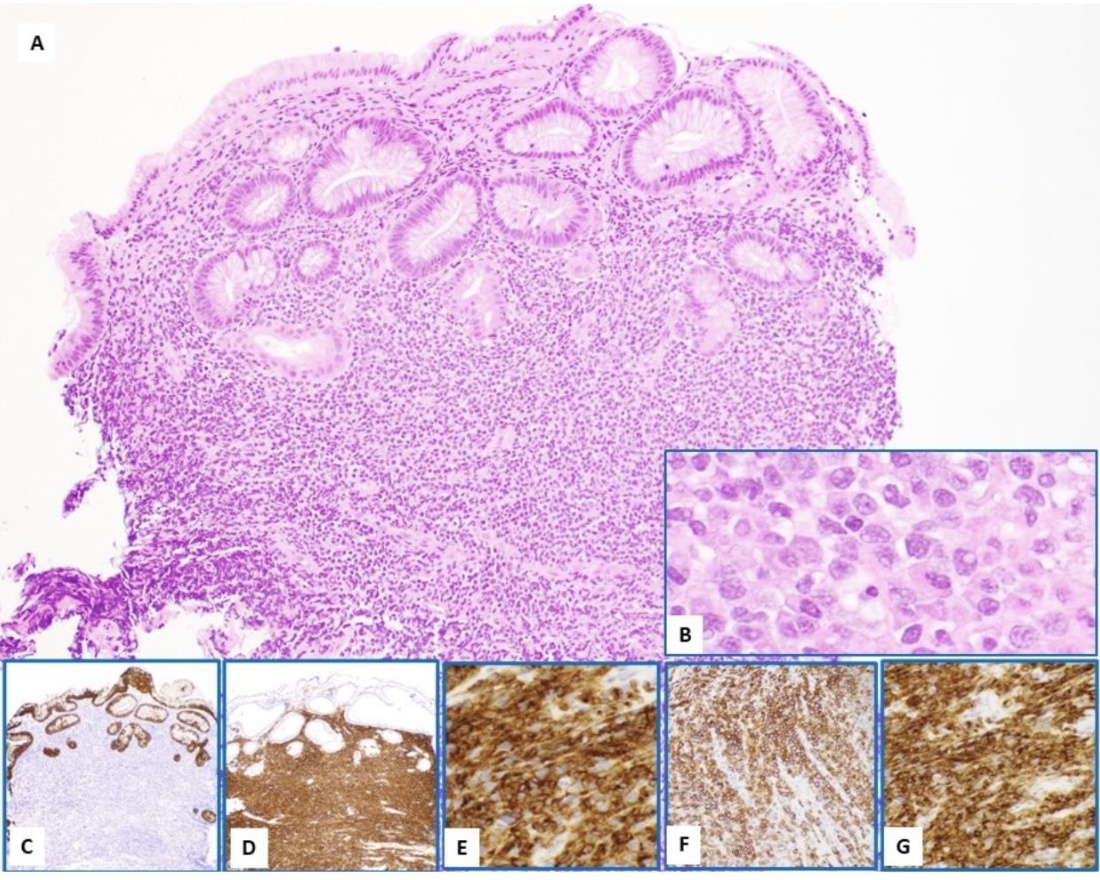Tuesday Poster Session
Category: Stomach and Spleen
P6370 - Gastric MALT Lymphoma in Plummer-Vinson Syndrome: Broadening the Spectrum of Associated Malignancies
Tuesday, October 28, 2025
10:30 AM - 4:00 PM PDT
Location: Exhibit Hall

Rhett Harmon, MD (he/him/his)
Olive View-UCLA Medical Center
Los Angeles, CA
Presenting Author(s)
Rhett Harmon, MD1, Nicholas Cheung, MD2, Dorian Mendoza, MD3, Payman Fathizadeh, MD2, Shaun Chandna, DO2, Daniel Cole, MD, MPH1
1Olive View-UCLA Medical Center, Los Angeles, CA; 2Olive View-UCLA Medical Center, Sylmar, CA; 3David Geffen School of Medicine at UCLA, Los Angeles, CA
Introduction: Plummer-Vinson Syndrome (PVS) is a rare condition predominantly affecting middle-aged women. Classic triad includes iron deficiency anemia (IDA), esophageal webs, and dysphagia, though many presentations are incomplete. PVS has hematologic manifestations and associated risk of upper gastrointestinal malignancies, typically squamous cell carcinoma (SCC) of the pharynx and esophagus, and, to a lesser extent, oral cancer. We report a rare case, to our knowledge not previously reported, of Mucosa-Associated Lymphoid Tissue (MALT) lymphoma in PVS.
Case Description/
Methods: 59-year-old male with cirrhosis presented with abdominal distention and anemia. He received 2 units packed red blood cells at an outside hospital. Labs revealed severe microcytic anemia; hemoglobin (Hb) 7.8 g/dL, MCV 66 fL, RDW 20.7. Iron studies confounded by transfusion (pre-transfusion studies not available). Hb electrophoresis showed low HbA2 supportive of IDA. EGD showed esophageal web at 15 cm dilated and traversed, 2 cm pedunculated antral polyp, 3-4 cm mass at distal lesser curvature of the gastric body/angularis, and 4-5 cm friable mass in the fundus. Biopsies of both masses confirmed MALT lymphoma with negative Helicobacter pylori staining. CT imaging showed no adenopathy or clear distant metastases; overall presentation consistent with localized disease.
Discussion: Patients with IDA and esophageal webs are known to have an increased risk of malignancy in PVS, typically SCC of the pharynx and esophagus; the risk ranges from 4-16%. Chronic iron deficiency may lead to esophageal muscle atrophy, impaired mucosal repair against oxidative stress, and chronic inflammation, resulting in web formation. Continued injury may subsequently predispose the esophagus to malignant transformation. Gastric cancer in PVS has been rarely described, with scant cases of adenocarcinoma and a case of synchronous carcinoid with adenocarcinoma reported. To our knowledge, MALT lymphoma has not been previously reported in PVS. MALT lymphoma has been thought to arise from chronic immune stimulation triggered by bacterial, viral, or autoimmune conditions and has been primarily seen in Helicobacter pylori infection. One proposed mechanism of chronic immune activation as a driver of malignant transformation in prolonged IDA involves B- and T-cell clone accumulation due to sustained immune stimulation. Our case highlights importance of awareness in PVS of traditional SCC and extremely rare gastric cancer risks including MALT lymphoma.

Figure: Gastric biopsies demonstrate fragments of mucosa extensively infiltrated by a dense atypical lymphoid population (A). The neoplastic infiltrate consists of small to intermediate-sized lymphocytes characterized by irregular nuclear contours, condensed chromatin, inconspicuous nucleoli, and abundant cytoplasm (B). Immunohistochemical analysis reveals complete loss of native gastric glands, as highlighted by pankeratin staining (C). The infiltrate demonstrates diffuse positivity for B-cell markers including CD20 (D), PAX-5 (E), and immunoreactivity to CD43 (F), and BCL2 (G). The neoplastic cells are negative for CD3, CD5, CD23, BCL1, and BCL6, and exhibit kappa light chain restriction (not shown).
Fluorescence in situ hybridization (FISH) analysis demonstrates MALT1 gene rearrangement t(11;18)(q21.2;q21.32), confirming the diagnosis of gastric mucosa-associated lymphoid tissue (MALT) lymphoma.

Figure: Figures A and B: Large 3-4 cm mass on distal lesser curvature of gastric body/angularis. Irregular vascular pattern with spontaneous oozing.
Figure C: Large 4-5 cm mass, friable, with irregular vascular pattern in the fundus.
Disclosures:
Rhett Harmon indicated no relevant financial relationships.
Nicholas Cheung indicated no relevant financial relationships.
Dorian Mendoza indicated no relevant financial relationships.
Payman Fathizadeh indicated no relevant financial relationships.
Shaun Chandna: Arrowhead Pharmaceuticals – Grant/Research Support. Calliditas Therapeutics (formerly Genkyotex) – Grant/Research Support. Ipsen – Consultant. Lipocine – Grant/Research Support. Mirum Pharmaceuticals – Consultant, Grant/Research Support.
Daniel Cole indicated no relevant financial relationships.
Rhett Harmon, MD1, Nicholas Cheung, MD2, Dorian Mendoza, MD3, Payman Fathizadeh, MD2, Shaun Chandna, DO2, Daniel Cole, MD, MPH1. P6370 - Gastric MALT Lymphoma in Plummer-Vinson Syndrome: Broadening the Spectrum of Associated Malignancies, ACG 2025 Annual Scientific Meeting Abstracts. Phoenix, AZ: American College of Gastroenterology.
1Olive View-UCLA Medical Center, Los Angeles, CA; 2Olive View-UCLA Medical Center, Sylmar, CA; 3David Geffen School of Medicine at UCLA, Los Angeles, CA
Introduction: Plummer-Vinson Syndrome (PVS) is a rare condition predominantly affecting middle-aged women. Classic triad includes iron deficiency anemia (IDA), esophageal webs, and dysphagia, though many presentations are incomplete. PVS has hematologic manifestations and associated risk of upper gastrointestinal malignancies, typically squamous cell carcinoma (SCC) of the pharynx and esophagus, and, to a lesser extent, oral cancer. We report a rare case, to our knowledge not previously reported, of Mucosa-Associated Lymphoid Tissue (MALT) lymphoma in PVS.
Case Description/
Methods: 59-year-old male with cirrhosis presented with abdominal distention and anemia. He received 2 units packed red blood cells at an outside hospital. Labs revealed severe microcytic anemia; hemoglobin (Hb) 7.8 g/dL, MCV 66 fL, RDW 20.7. Iron studies confounded by transfusion (pre-transfusion studies not available). Hb electrophoresis showed low HbA2 supportive of IDA. EGD showed esophageal web at 15 cm dilated and traversed, 2 cm pedunculated antral polyp, 3-4 cm mass at distal lesser curvature of the gastric body/angularis, and 4-5 cm friable mass in the fundus. Biopsies of both masses confirmed MALT lymphoma with negative Helicobacter pylori staining. CT imaging showed no adenopathy or clear distant metastases; overall presentation consistent with localized disease.
Discussion: Patients with IDA and esophageal webs are known to have an increased risk of malignancy in PVS, typically SCC of the pharynx and esophagus; the risk ranges from 4-16%. Chronic iron deficiency may lead to esophageal muscle atrophy, impaired mucosal repair against oxidative stress, and chronic inflammation, resulting in web formation. Continued injury may subsequently predispose the esophagus to malignant transformation. Gastric cancer in PVS has been rarely described, with scant cases of adenocarcinoma and a case of synchronous carcinoid with adenocarcinoma reported. To our knowledge, MALT lymphoma has not been previously reported in PVS. MALT lymphoma has been thought to arise from chronic immune stimulation triggered by bacterial, viral, or autoimmune conditions and has been primarily seen in Helicobacter pylori infection. One proposed mechanism of chronic immune activation as a driver of malignant transformation in prolonged IDA involves B- and T-cell clone accumulation due to sustained immune stimulation. Our case highlights importance of awareness in PVS of traditional SCC and extremely rare gastric cancer risks including MALT lymphoma.

Figure: Gastric biopsies demonstrate fragments of mucosa extensively infiltrated by a dense atypical lymphoid population (A). The neoplastic infiltrate consists of small to intermediate-sized lymphocytes characterized by irregular nuclear contours, condensed chromatin, inconspicuous nucleoli, and abundant cytoplasm (B). Immunohistochemical analysis reveals complete loss of native gastric glands, as highlighted by pankeratin staining (C). The infiltrate demonstrates diffuse positivity for B-cell markers including CD20 (D), PAX-5 (E), and immunoreactivity to CD43 (F), and BCL2 (G). The neoplastic cells are negative for CD3, CD5, CD23, BCL1, and BCL6, and exhibit kappa light chain restriction (not shown).
Fluorescence in situ hybridization (FISH) analysis demonstrates MALT1 gene rearrangement t(11;18)(q21.2;q21.32), confirming the diagnosis of gastric mucosa-associated lymphoid tissue (MALT) lymphoma.

Figure: Figures A and B: Large 3-4 cm mass on distal lesser curvature of gastric body/angularis. Irregular vascular pattern with spontaneous oozing.
Figure C: Large 4-5 cm mass, friable, with irregular vascular pattern in the fundus.
Disclosures:
Rhett Harmon indicated no relevant financial relationships.
Nicholas Cheung indicated no relevant financial relationships.
Dorian Mendoza indicated no relevant financial relationships.
Payman Fathizadeh indicated no relevant financial relationships.
Shaun Chandna: Arrowhead Pharmaceuticals – Grant/Research Support. Calliditas Therapeutics (formerly Genkyotex) – Grant/Research Support. Ipsen – Consultant. Lipocine – Grant/Research Support. Mirum Pharmaceuticals – Consultant, Grant/Research Support.
Daniel Cole indicated no relevant financial relationships.
Rhett Harmon, MD1, Nicholas Cheung, MD2, Dorian Mendoza, MD3, Payman Fathizadeh, MD2, Shaun Chandna, DO2, Daniel Cole, MD, MPH1. P6370 - Gastric MALT Lymphoma in Plummer-Vinson Syndrome: Broadening the Spectrum of Associated Malignancies, ACG 2025 Annual Scientific Meeting Abstracts. Phoenix, AZ: American College of Gastroenterology.
